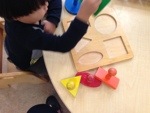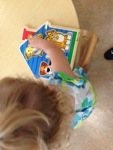The children have been spending a lot of time working on puzzles every day. While they flip, turn, and remove each piece of the puzzle, they are working on their eye-hand coordination and fine motor skills. Working on these skills early on will help the children later on when they learn how to write. Puzzle-solving experiences also help young toddlers learn math concepts such as size, length, and spatial awareness. Room One teachers pay close attention to the type of puzzles that are set out for the children. You will see that in our shelf we have puzzles with knobs which help with small-finger coordination. Also, our puzzles are based on the children’s interests and abilities. Room One teachers also scaffold the children while they work on the puzzles by doing the following:
Using language: Are you looking for a big piece or small piece? I wonder what will happen if you try turning that piece around? I see you are trying to fit the duck into the spot.
Offering direction: Taking a puzzle piece and turning it to see if would fit.
Recognize their accomplishments or progress: Look, you have been working so hard on completing this puzzle. You have two pieces left and you will be done.
You can also do puzzles while at home to support your children with these skills.


